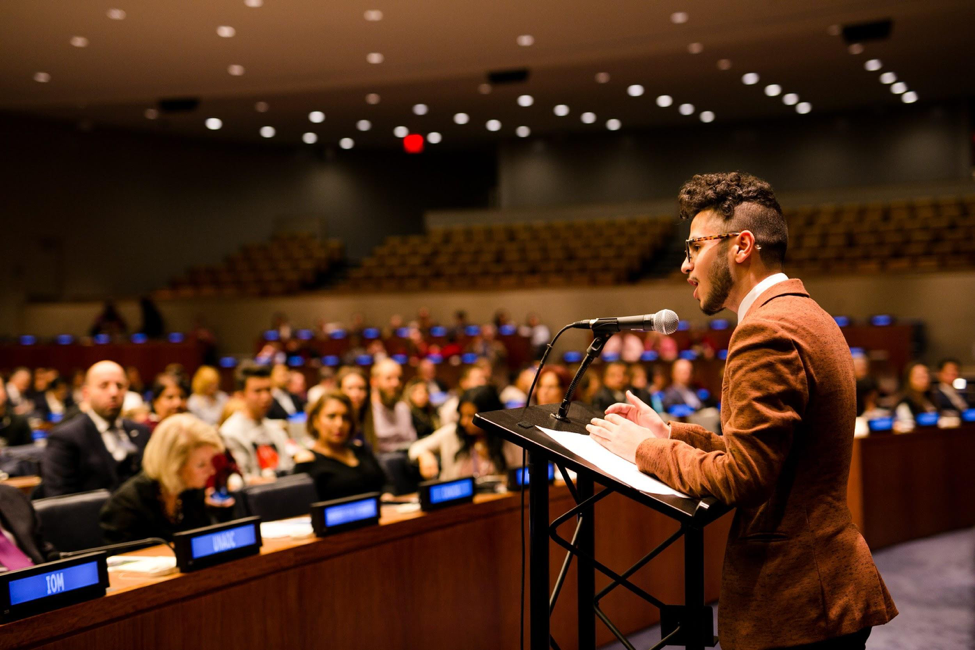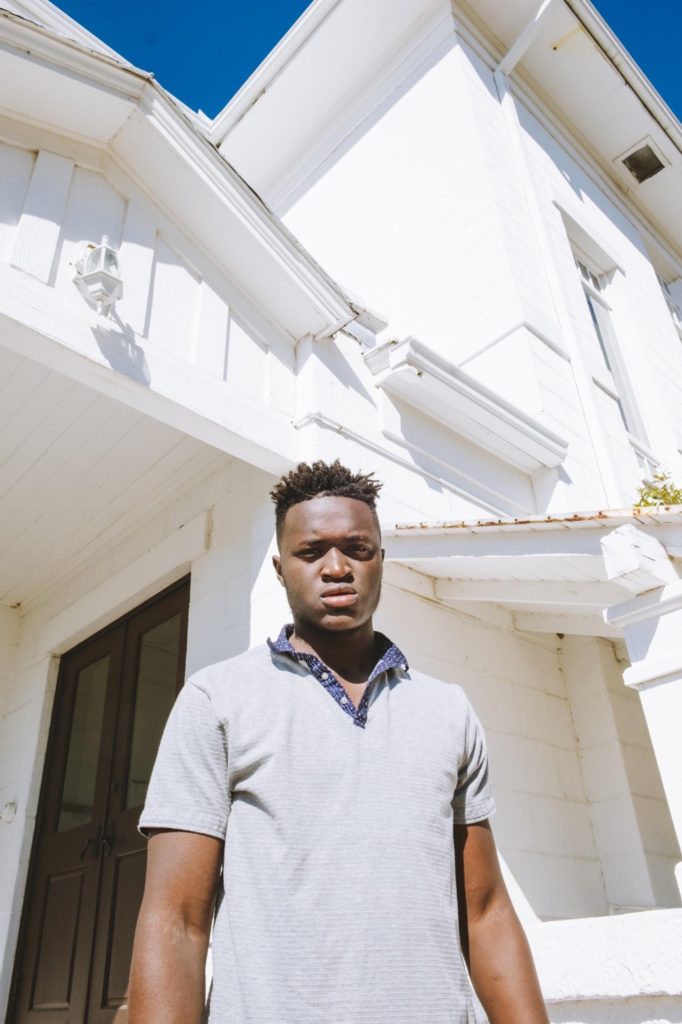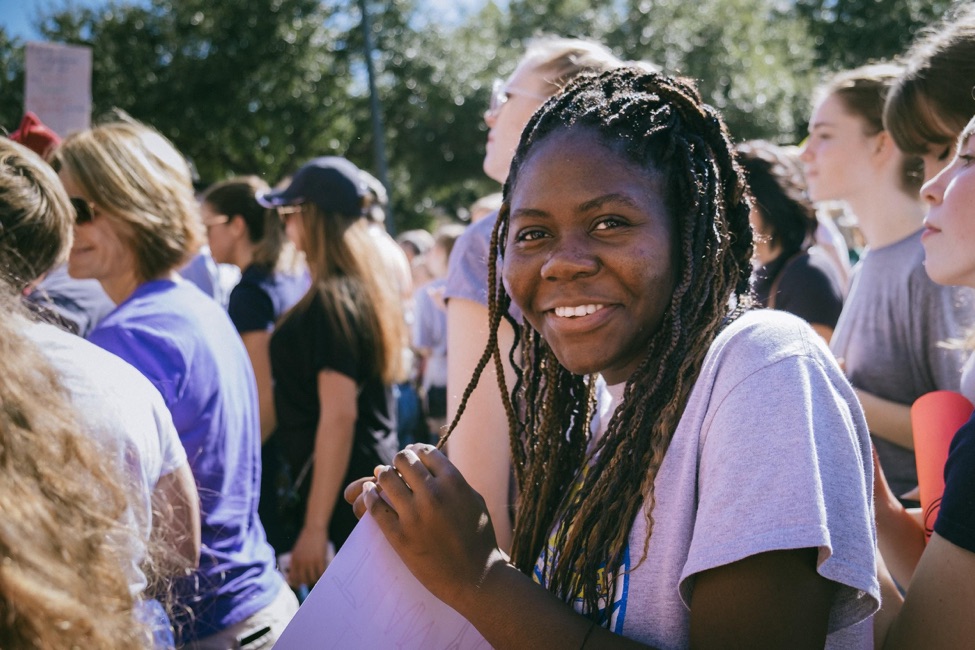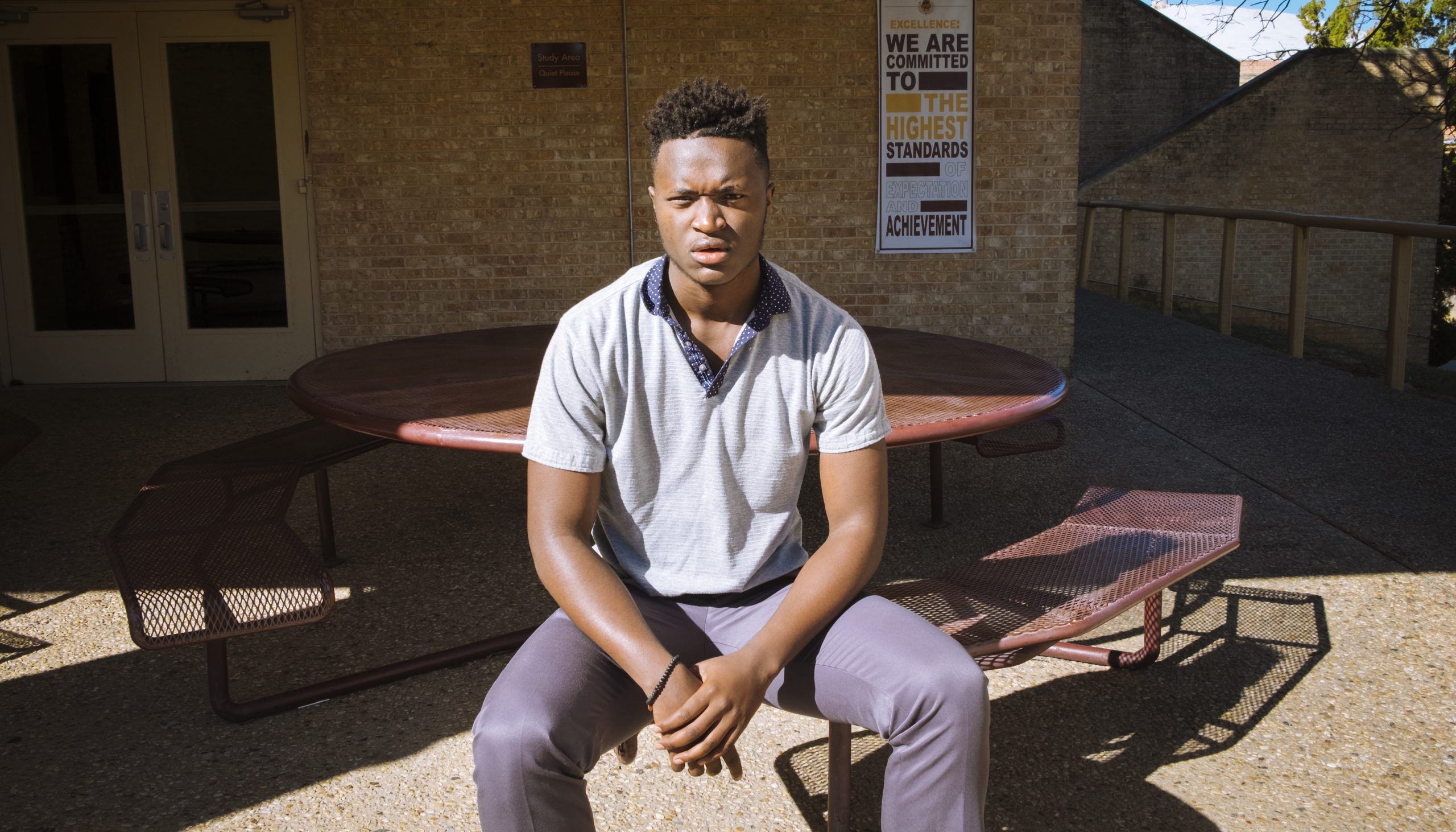The story of the refugee in America has always been one of controversy, of the idyllic “American dream” but also of xenophobia and nativism. People escaping extreme, life-threatening adversity and persecution have been met in America by both welcoming arms and threatening glances. Most recently, President Donald Trump has referred to “Haiti and African nations” with derogatory terms while discussing national immigration policy, and has lowered the 2018 cap on admitted refugees to the United States to an all-time low. America struggles with dissonance in its rhetoric and policy around refugees, as messages of nationalism and bigotry contradict the narrative of America as a home for all seeking shelter and safety—and this tension is surely impacting those arriving from areas of active conflict, political disintegration, famine, and oppression. One might assume that, for young people who know little of their home country and who have spent their lives in refugee camps hearing stories of this American dream, this incongruity would be hugely demoralizing. Yet instead of succumbing to the pressures of ongoing, sometimes implicit forms of oppression and discrimination in America, refugees—specifically those who arrive to the United States at a young age—are carving a path for themselves that no president, immigration ban, nor populist campaign message can curb.
Young refugees are actively pursuing education America. In a groundbreaking working paper published in June 2017, Notre Dame professors William Evans and Daniel Fitzgerald reveal some important findings about refugees in America: in addition to paying $20,000 more to the government than they receive in government programs over the course of twenty years, refugees arriving in America under the age of thirteen are graduating from college at higher rates than native-born students. This means that young refugees are overcoming both dehumanizing rhetoric and institutionalized barriers, such as poor school districts, meager access to after-school programming, and minimal experience with the American educational system as a whole, to build their own American dreams, developing and relying on the qualities of individualism, perseverance, and intellect that, for many, embody precisely what it means to be American.
In an interview with the HPR, Ahmed Badr, a Wesleyan University sophomore who left Iraq and arrived in America on refugee status at the age of ten years old, said that the data about education and refugees presented in the working paper was “surprising but not surprising at the same time.” Badr explained, “I’ve seen the resilience of refugee youth, so I understand it.” But, as Badr points out, the story of young refugees’ success isn’t simply the result of personal resilience. There are pervasive cultural, economic, and community-related differences in the ways that young refugees approach education when compared with native-born students. It is these differences, Badr argues, that are at the root of young refugees’ growing achievements.

Ahmed Badr speaking at the United Nations, November 2017.
Redie Mumbili is a freshman at Huston-Tillotson University in Austin, Texas. He arrived in the United States at the age of 11 from the Democratic Republic of the Congo. The last time he saw his home country was at the age of seven, when his family fled war and unrest in the Kivu region of the DRC and crossed Lake Tanganyika by boat to Tanzania, where they would live in a refugee camp for four years. In an interview with the HPR, Mumbili shared memories of a DRC where natural beauty contrasted with relentless violence, a duality that has made him appreciative of the opportunities available in America and that has left him with a desire to learn about, and eventually help bring peace to, his former home.
“When I was young,” Mumbili said, “everyone told me America was like heaven. I was expecting everything to be free and nobody to have it hard.”
The reality that a young Mumbili found when he arrived in Texas was quite different from the stories he had heard in Tanzania and the DRC. “I realized that no place on earth is perfect” Mumbili said, “which motivated me to go back because Congo is a normal place with problems, like everywhere else, which also means that [the problems] can be fixed.” However, to succeed academically in America as a refugee and equip himself with the necessary knowledge to help fix those problems has not been a simple process.
When Mumbili arrived in Texas from Tanzania, he found himself at a crossroads of culture and education, as many arriving refugees do. His education had been interrupted while he was in the refugee camp in Tanzania, and the process of learning to understand and engage with the complexities of American culture—as well as with the intricacies of middle school drama— proved challenging. Mumbili recounted how he found a community among other refugees and immigrants from Africa, and it is the support of this community to which Mumbili credits much of his achievement. “We didn’t know much about college until our junior year of high school,” said Mumbili, “but we always got good grades. That’s just what we did.”
Preparing for and applying to college, a challenging task for practically anyone, can be magnitudes more difficult for refugee youth, simply due to a lack of familiarity with different systems of higher education and the complex story they have to tell in their applications. This generally means that refugee youth must do more research and preparation in order to even keep up with their peers during the college application process. Over the last year, Mumbili, along with a small group of mainly high school and college African refugees and immigrants, founded an organization called the Austin-African Community Association to help counter this problem. In describing the organization, Mumbili reaffirmed that the success of these young refugees in school isn’t necessarily due to effective, school-provided college counseling, but instead can be attributed to the support of refugee and immigrant communities whose members actively look out for each other. In many ways, Mumbili depicted the process of achieving higher education as one of learning together as a community. In the American system of education, meritocracy prioritizes individual success over group collaboration, but young refugees seem to be challenging these assumptions, taking a different approach to success by relying on and supporting those they are connected to by experiences of adversity, shared language, and similar cultural background. These bonds, epitomized by Mumbili’s experience, have likely contributed to the achievements of young refugees in the American education system.

Redie Mumbili at Huston-Tillotson University, January 2018.
When asked why he valued education so dearly, Badr said that in his experience, it has always been “the most accessible source of empowerment.”
“If your family is going through financial struggles, or your parents are struggling,” Badr said, “you learn that, although as a young person you cannot always work and bring money to the family, you can affirm your parents by making good grades and getting an education.”
Badr’s story begins in Iraq, where his childhood home was bombed while he was away at his grandparents’ house. His journey then led him to Syria, and eventually the United States, where he enrolled at a local high school in Houston, Texas. In a recent project Badr has been working on, called Unpacked: Refugee Baggage, Badr asked many young refugees about their goals in America. Most commonly, Badr found that these young people cite “the dream of education.” He pointed out that when refugees imagine life in America, it’s not uncommon for their primary goal to be securing an education for their children. Although an education cannot remedy immediate financial strife, it does promise a transition toward prosperity and a hope for a more independent future. Badr explained how pervasive generational expectations and goals can impact the refugee experience; while parents begin working jobs with long hours and trying to learn English, their children are expected to put their energy into educational success.
Parental pressure can be intense in refugee communities, but this should not come as any surprise. Contrary to the belief of many Americans, refugee communities are in fact usually composed of former teachers, engineers, professors, and even doctors, many of whom work hourly-wage jobs in America due to language barriers or expensive recertification programs. Badr’s experience, however, highlights an important factor in understanding part of the reason that young refugees are experiencing high levels of academic success: “welcomed obligation,” as he calls it. Indeed, parental pressure means that young refugees feel a sense of responsibility to be successful in school. But while many students in the American system find pressure from parents to be constricting or counterproductive, Badr said that his impression is that, for many young refugees, this pressure is emboldening. “It’s my duty to make my parents’ work count for something,” Badr said, and “the least I can do is do well on my schoolwork.”
A Possible Journey
Kahindo Musongira is the third of six children in her family. She is currently a freshman at Texas A&M University in College Station, Texas. Musongira left the DRC with her family at the age of six, and found a new home in Uganda, where she would live for seven years. At 13, Musongira flew to Austin, and it was here that she began her journey in the American education system.
In an interview with the HPR, Musongira said that she’s “always been motivated,” but that many of her goals—the first of which is to graduate from law school—stem from experiences of injustice in the United States. “When my brothers first tried to go to high school,” she said, “they were older, so the administration told them that they shouldn’t go to school and should just get a job.” Today, though, both of her older brothers have graduated from high school and are enrolled in college. Musongira explained that there have been many moments during which she has felt that her family has been dismissed or underestimated in the United States; she shared that once, for instance, her family went to pick up medication from a pharmacy, but the pharmacist would only give them expired medication. Musongira theorizes that this was because the pharmacist thought that nobody in the family spoke English.
While law school was always a dream for Musongira, she explained that “people used to think that [she] just liked talking.” Musongira believed in herself from the beginning, but she said that once people realized that she was serious about attending college, the quality and rigor of her school of choice was constantly questioned by others, which eventually caused her to further doubt that the system would work in her favor in America. This was until, she remembered, she “met a refugee who went to graduate school at A&M,” which made her “realize that if one refugee could do it, [she] could as well.”
Musongira believes that these kinds of interactions are quite possibly among the most important causes of young refugees’ success in the American educational system. For her, it was this process of meeting other successful refugees who had gone to college or were working professional jobs that helped her to realize that success was possible for her too. Just as U.S.-born students whose family members have attended college are statistically more likely to attend college themselves, young refugees with knowledge of older refugees who have attended college might feel more empowered to pursue higher education themselves. The importance, then, of not only developing communities of like-minded and ambitious peers who can work together, but also of seeing clear role models in positions of status, is undeniable.

Kahindo Musongira at the Austin Women’s March, January 2017.
In interviews with all three refugees, Musongira, Mumbili, and Badr, the HPR asked what sets young refugees apart from their older counterparts. The responses from all three were fairly similar. Each interviewee attended an English Language Learners program for a short period of time when they arrived in the United States, and were thus able to quickly learn English, equipping them with the tools to understand and assimilate into American culture. Furthermore, due to their ages, none of them were allowed to work when they first arrived in the United States, meaning that, as Badr and Musongira both referenced, making good grades was their way of helping the family survive. The third and last point discussed by all three interviewees was that young refugees, due to their participation in schools, had the ability to bond with a community of fellow refugees in a way that their parents and other older refugees did not, allowing them to build strong relationships and to bond over the experience of “trying to figure out who you are when coming from a diaspora,” as Badr described.
Conversations about refugees’ success in America, especially among those who arrive here at a young age, are crucial particularly at this time of scrutiny for programs such as the U.S. Refugee Resettlement Program and the UNHCR. Misinformation and absent nuance in public rhetoric about refugees and other immigrants have contributed to heightened xenophobia in recent years; the reality, however, is that young refugees today are embodying what many would call the American dream: a story of determination, support, and success of which all Americans should be proud.
Featured Image Source: Campbell Erickson
In-Text Image Sources (in order): Carol Biazotto, Campbell Erickson, Campbell Erickson
